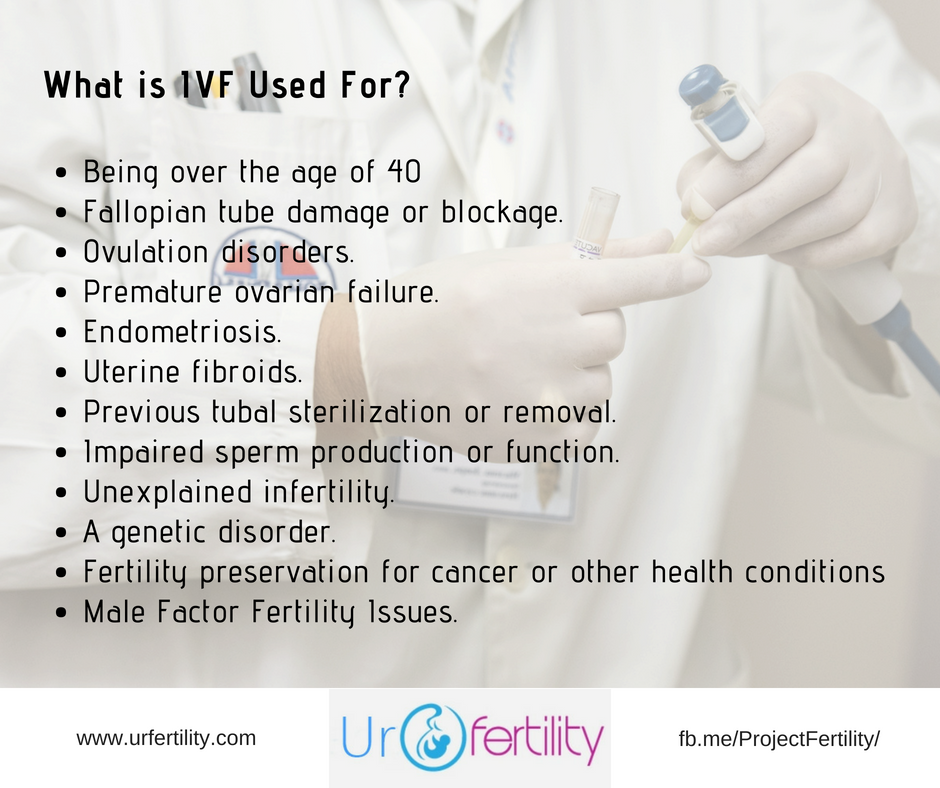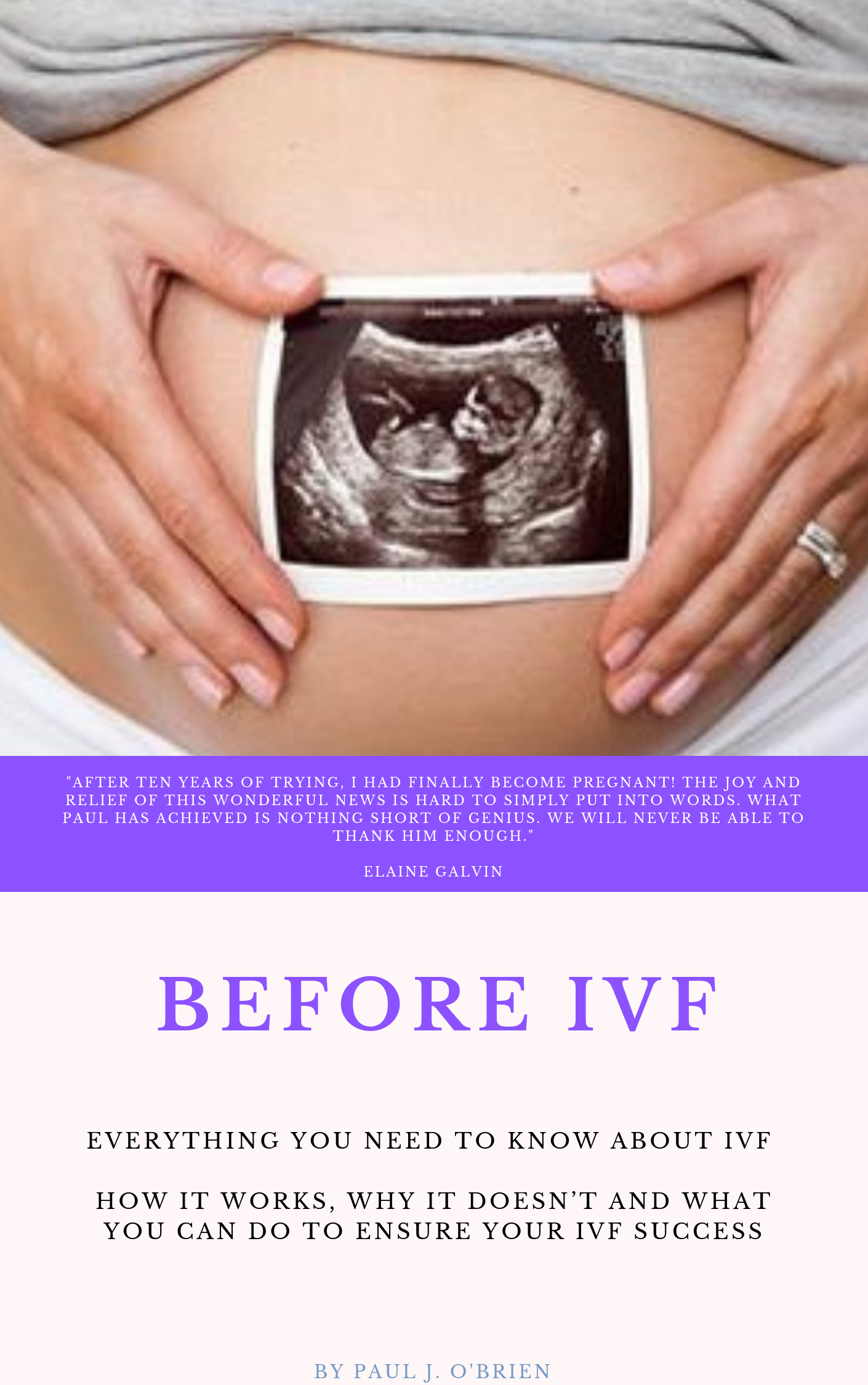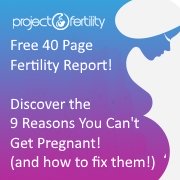What is IVF Used For?
All The Reasons You May Need IVF Explained
By Paul J.O'Brien B.A., N.C.E.H.S., Dip. Acu., Adv. Dip. OBB, Cert Clin. Med, Cert.CHM, Pn1, PN-SSR, PN-NCA, M.AFPA, M.ETCMA, M.C.Th.A.
What is IVF used for? Why IVF treatment is done? Well originally, IVF was intended only to help those women with blocked fallopian tubes and to get around the issue of Endometriosis. However, studies, including a 2013 meta-analysis of 27 studies of 8,984 women going through IVF found that poor implantation and pregnancy rates was significantly associated with those women suffering from severe endometriosis (1).
 What is IVF used for
What is IVF used forWhat is IVF Used For?
Unfortunately, today nearly any couple trying for a baby without success after 2 years of regular unprotected sexual intercourse (2) are rushed into IVF. And god forbid you are a woman over 35! (Don’t worry about age. It’s not as big a problem as you may have been led to believe!). As such nowadays fertility clinics and ART health centres claim that IVF should be used in cases of:
- Being over the age of 40 (no, that is not a joke. The Mayo Clinic and many more fertility centres around the world see being make IVF the automatic primary choice for women over 40, though this is now shifting to the more expensive and emotional suggestion of egg donation).
- Fallopian tube damage or blockage. Fallopian tube damage or blockage makes it difficult for an egg to be fertilized or for an embryo to travel to the uterus.
- Ovulation disorders. If ovulation is infrequent or absent, fewer eggs are available for fertilization.
- Premature ovarian failure. Premature ovarian failure is the loss of normal ovarian function before age 40. If your ovaries fail, they don't produce normal amounts of the hormone estrogen or have eggs to release regularly.
- Endometriosis.Endometriosis occurs when the uterine tissue implants and grows outside of the uterus — often affecting the function of the ovaries, uterus and fallopian tubes.
- Uterine fibroids. Fibroids are benign tumors in the wall of the uterus and are common in women in their 30s and 40s. Fibroids can interfere with implantation of the fertilized egg.
- Previous tubal sterilization or removal. If you've had tubal ligation — a type of sterilization in which your fallopian tubes are cut or blocked to permanently prevent pregnancy — and want to conceive, IVF may be an alternative to tubal ligation reversal.
- Impaired sperm production or function. Below-average sperm concentration, weak movement of sperm (poor mobility), or abnormalities in sperm size and shape can make it difficult for sperm to fertilize an egg. If semen abnormalities are found, your partner might need to see a specialist to determine if there are correctable problems or underlying health concerns.
- Unexplained infertility. Unexplained infertility means no cause of infertility has been found despite evaluation for common causes. This one I strongly take issue with. Approximately 8-20% of all couples, having gone through every test possible (all though that is often not the case, it just feels like that) are told - there is no reason. That is just not true.
In the hundreds of cases that I have treated and in the hundreds I've been referred to over the years, I have never yet seen a case that cannot be fully and accurately diagnosed and explained
Let me assure you right now there is no such thing as unexplained infertility - just their failure to find a box to shove you in or label to stamp on you - it's their failure, not yours, because there is a diagnosis that can be made and thus a treatment and route you can go to solve the problem.
- A genetic disorder. If you or your partner is at risk of passing on a genetic disorder to your child, you may be candidates for preimplantation genetic diagnosis — a procedure that involves IVF. After the eggs are harvested and fertilized, they're screened for certain genetic problems, although not all genetic problems can be found. Embryos that don't contain identified problems can be transferred to the uterus.
- Fertility preservation for cancer or other health conditions. If you're about to start cancer treatment — such as radiation or chemotherapy — that could harm your fertility, IVF for fertility preservation may be an option. Women can have eggs harvested from their ovaries and frozen in an unfertilized state for later use. Or the eggs can be fertilized and frozen as embryos for future use.
- Male Factor Fertility Issues. This accounts for approximately 40% of fertility problems and includes poor sperm count, low volume, poor concentration, poor morphology (the sperm are not shaped right), poor motility (they don’t swim well) and so forth.
As you can see the list of " What is IVF Used For?" is pretty long and in some cases very vague. Given this, it's no surprise that IVF has become the first and final solution for most fertility problems, regardless of whether it is appropriate, will be successful or the risks.
You've been reading "What is IVF Used For?" In my next article I'll be explaining The Risks of IVF - and these may be more serious than you realise at first. Click here to continue.
What is IVF used for...Your Next Best Step...
If you’re trying for a family or planning on going through IVF, ICSI IUI, or have been through failed rounds, from poor egg growth, fertilization failure, sperm quality issues, miscarriage etc, and want to give this round the best possible shot of success and dramatically improve your fertility and reproductive health, to have a happy healthy baby, then …
- Download my Free "9 Reasons You Can't Get Pregnant" Guide to learn more about what complications may be present and what you can do to fix them!
- Subscribe to my newsletter to keep up to date with the new articles, how to guides, fertility recipes and more.
- Get Your Copy of "Before IVF: How it works, why it doesn’t and what you can do to Ensure Your IVF Success!". Over 430 pages, this guide provides answers to every question you could ask about fertility and how to maximise your reproductive health. It will help you beat the numbers in IVF and better still may help you conceive without ever having to go through IVF!
- Contact me with your particular questions and concerns and I'll do my best to help. :-)
Footnotes
- Harb H, Gallos I, Chu J et al. The effect of endometriosis on in vitro fertilization outcome: a systematic review and meta-analysis. BJOG 013;120:1308-20
- Fertility: assessment and treatment for people with fertility problems. NICE clinical guideline ;– Issued: February 2013



New! Comments
Have your say about what you just read! Leave me a comment in the box below.